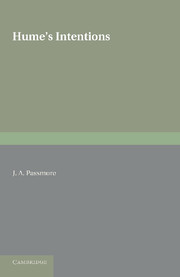Book contents
EPILOGUE: HUME'S ACHIEVEMENT
Published online by Cambridge University Press: 05 June 2016
Summary
Hume's reputation was not easily won: in England, it dates back only to the last decades of the nineteenth century. And, even now, he has his detractors. A. E. Taylor doubted whether Hume is a great philosopher—‘a very clever man’ is the utmost concession he would allow. But this is mild criticism compared with Prichard's downright denunciation: ‘The Treatis’, he wrote, ‘is one of the most tedious of books, and close examination of it renders me not sceptical but angry. Of course, there is a great deal of cleverness in it, but the cleverness is only that of extreme ingenuity or perversity, and the ingenuity is only exceeded by the perversity. …It could be wished that the student of philosophy could be spared all contact with Hume, and thereby the trouble of rooting out some of the more gratuitous forms of confusion common to philosophy.’
Hume certainly had an ingenious mind: he took such delight in reconciling apparent exceptions with his hypotheses that the very ingenuity with which this is done tells against him. ‘Cleverness’, in the dyslogistic sense of the word, is a not inadequate description of Hume at his worst. One must add, however, that the Treatise is much more subject to this defect than the Enquiry; ‘cleverness’ is an undergraduate vice, and Hume largely conquers it, as not every philosopher has succeeded in doing. But Hume's mind, even at its best, was not of the most disciplined sort. Rigour and consistency were not his strong points, and these are qualities which we ordinarily expect from a great philosopher’.
On the other side, philosophical rigour is sometimes difficult to distinguish from rigor mortis; Hume is genuinely speculative, genuinely experimental, with no inclination to set up axioms or to construct deductive systems. If he is so often led into inconsistencies, or into tortuous and implausible ingenuities, this is partly because he has a real respect for facts; he is never tempted to dismiss exceptions as ‘appearances’.
- Type
- Chapter
- Information
- Hume's Intentions , pp. 152 - 160Publisher: Cambridge University PressPrint publication year: 2013



